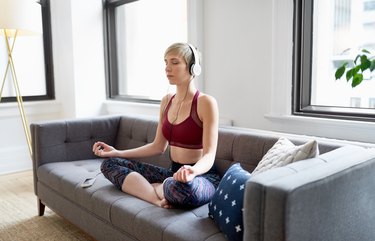
You might expect to feel your calmest first thing in the morning. After all, you haven't had much time to ruminate about your worries or run into situations that stress you out when you're just waking up. But for many people, those early hours can actually be the most nerve-wracking of the entire day.
In fact, many experts say it's not uncommon to feel more tense in the morning than during other times of the day — and that waking up anxious isn't necessarily a sign of an anxiety disorder.
Video of the Day
Video of the Day
What's more, simple habit shifts can often be enough to help you feel more relaxed in the a.m.
Why You're Waking Up With Anxiety
The reasons why largely have to do with biology.
"Anxiety occurs first thing in the morning for many people because of the body's natural rise in the stress hormone cortisol that we produce when we sleep," explains Lana Lipe, LCSW, licensed clinical social worker and owner of Honu Therapy Services in Honolulu.
This cortisol spike seems to be especially likely if you spent the night before stressing about what the day will bring, found an August 2019 study in Psychoneuroendocrinology.
Also? While the quiet of the morning might seem like it would feel tranquil, the lack of activity can actually create more space for anxious thoughts to bubble up.
"When we are still, we can more clearly see what is happening for us," says Pauline Peck, PhD, a Santa Barbara, California-based psychologist.
But then those stressful feelings may fade in the hustle and bustle of the day: "When the day has begun and we are moving and distracted and our minds are busy with thoughts and responsibilities, often we can disconnect from how we're feeling," Peck says.
How to Cope With Morning Anxiety
Feeling anxious upon waking up isn't all that unusual, but it's not fun either. The good news, experts say, is that there are ways to stop a.m. stress from snowballing so it doesn't steamroll your day.
1. Swap Coffee for Water
Your morning cuppa might help you feel more awake, but stimulants like caffeine can exacerbate anxiety, according to the American Psychiatric Association.
"Coffee tricks the body into going into fight-or-flight mode," Lipe says. "If your anxiety is already high in the morning, drinking coffee is like adding fuel to the fire."
Try gradually cutting back on caffeine and starting your day with a big glass of water instead. "Water helps flush cortisol from your body faster," she says.
2. Eat a Healthy Breakfast
Similar to coffee, having sugary or refined carbohydrates in the morning can "stimulate your nervous system further," explains Naomi Murphy, a doctor of clinical psychology based in Peterborough, England.
Skip the muffin or sugary cereal in favor of a balanced breakfast that delivers complex carbohydrates, protein and healthy fat. Think: a veggie scramble with whole-grain toast or oatmeal with milk, fruit and nuts.
3. Take a Walk Outside
Exercise is a proven mood-booster and stress-buster. And you'll reap even more benefits when you're active outdoors.
"When we are in confined spaces, we tend to focus in on something, whereas very high ceilings and open space make it easier for our minds to wander and shift away from the thing that's eating us up," Murphy says.
4. Take a Cold Shower
Though the thought of hopping in frigid water might make you nervous, the actual practice can help your body relax.
"It stimulates the vagus nerve, which helps us feel calmer," Peck says.
Still not convinced? Look to the science. A November 2020 study in Lifestyle Medicine found that participants who took swimming lessons in cold water experienced noted improvements in their mood and wellbeing, while those who watched from the shoreline did not.
5. Make a To-Do List
If your mind is racing with the million things you need to make happen before the end of the day, write them down.
"Writing your to-do list helps you prioritize and organize your day," Lipe says. "It can help you figure out what to expect and allows you to clear some of your thoughts from your mind."
6. Meditate
Simple meditation techniques like visualization, deep breathing, progressive muscle relaxation and self-compassion exercises can help quiet your mind in the short term, Peck explains. But when practiced regularly — for a few minutes each morning, for example — the benefits become even more significant.
"Meditation helps us become more comfortable with the discomfort of the times when we do feel anxious. This is not going to relax us, per say, but it will help us feel more peaceful despite the anxious feelings we might be feeling," she says.
When to Seek Help for Anxiety Upon Waking
Waking up stressed or tense once in a while probably isn't cause for concern. "Having anxiety is a normal experience everyone has from time to time," Lipe says.
But seeing a mental health professional can help if you're anxious most mornings, if the anxiety seems to be getting worse or if it's interfering with your daily activities.
"There is no better place than therapy to unpack what your anxiety is sitting alongside and what it is trying to say to you," Peck says. "Emotions are messengers, and they give us information."
- Psychoneuroendocrinology: "Tomorrow's gonna suck: Today's stress anticipation predicts tomorrow's post-awakening cortisol increase"
- American Psychiatric Association: "What Are Anxiety Disorders?"
- Lifestyle Medicine: "Mood and well-being of novice open water swimmers and controls during an introductory outdoor swimming programme: A feasibility study"
Is this an emergency? If you are experiencing serious medical symptoms, please see the National Library of Medicine’s list of signs you need emergency medical attention or call 911.


